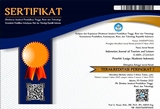Analisis Potensi Wisata Ha Long Bay Terhadap Perekonomian Vietnam
Abstract
This paper aims to explain how Ha Long Bay's tourism potential is one of UNESCO's world heritage and its implications for economic development in Vietnam. The author uses the national branding concept to analyzing the related phenomena. The results show that Ha Long Bay tourism increased the Vietnam's economic development due to an increase in economic growth through tourism sector revenues in GDP (Gross Domestic Product) of 9.3 percent. This sector is also able to provide employment to 3.7 percent of the total workers in Vietnam. Vietnam has also been named as one of the 10 countries in the world with the fastest growth rate of recovery in the tourism sector after the global monetary crisis in 2008-2009. The existence of a positive assessment from the international community certainly has implications for increasing visits from tourists and makes Ha Long Bay has its own charm and competitiveness in the global tourism industry.
Full Text:
PDFReferences
Adam, M. F. R., Iqbal, M., & Trihartono, A. (2017). Gastrodiplomacy Jepang di Indonesia Melalui Program Japan Halal Food Project (JHFP) Tahun 2013-2015. E-SOSPOL, IV(1), 12–19.
Anholt, S. (1998). Nation-Brands of The Twenty-First Century. Journal of Brand Management, 5, 395–406.
Galla, A. (2002). Culture and Heritage In Development Ha Long Ecomuseum, A Case Study From Vietnam. Journal of Humanities Research, Vol. 9(1), 63–68.
Gitman, L. J. (2006). Principles of Managerial Finance. Massachusetts: Addison-Wesley Publishing Company.
Hampton, M. P., Jeyacheya, J., & Long, P. H. (2017). Can Tourism Promote Inclusive Growth? Supply Chains, Ownership and Employment in Ha Long Bay, Vietnam. The Journal of Development Studies, 54(2), 359–376. https://doi.org/10.1080/00220388.2017.1296572
IUCN. (2013). Report of the Reactive Monitoring Mission to Ha Long Bay (Viet Nam).
IUCN. (2015). Situation Analysis of the Water Quality of Ha Long Bay, Quang Ninh Province, Vietnam.
JICA. (2013). The Project for Environmental Protection in Ha Long Bay.
Jones, E., & Haven-Tang, C. (2005). Tourism SMES, Service Quality and Destination Competitiveness. Wallingford: CABI.
Khuong, M. N., Thi Hong An, N., & Thi Mai Uyen, N. (2016). Direct and Indirect Effects on International Tourists‘ Destination Satisfaction — The Case of the World Natural Heritage of Halong Bay, Vietnam. Journal of Economics, Business and Management, 4(2), 85–91. https://doi.org/10.7763/joebm.2016.v4.372
Lestari, R. B., & Aprilia, R. (2013). Membangun Nation Branding dalam Upaya Meningkatkan Daya Saing Sektor Pariwisata Indonesia. Jurnal Elektronik, 5, 8–9.
Lloyd, K., & Morgan, C. (2008). Murky Waters: Tourism, Heritage and the Development of the Ecomuseum in Ha Long Bay, Vietnam. Journal of Heritage Tourism, 3(1), 1. https://doi.org/10.2167/jht016.0
Long, P. H. (2012). Tourism impacts and support for tourism development in Ha long Bay, Vietnam: An examination of residents’ perceptions. Asian Social Science, 8(8), 28–39. https://doi.org/10.5539/ass.v8n8p28
Mardyah, H. F. (2014). Studi Awal Eksplorasi: Faktor Pembentuk Nation Branding Indonesia. Universitas Kristen Maranatha.
Nurmansyah, A. (2014). Potensi Pariwisata Dalam Perekonomian Indonesia. Jurnal Ekonomi Bisnis Dan Kewirausahaan, 3(1), 46–48.
Papadopoulos, N., & Heslop, L. (2002). Country Equity And Country Branding: Problems And Prospects. Journal of Brand Management, 9(4/5), 294–314.
Raco, J. R. (2010). Metode Penelitian Kualitatif - Jenis, Karakteristik, dan Keunggulannya. Jakarta: PT. Gramedia Widiasarana Indonesia.
Rahayu, S., & Arianti, R. K. (2014). Persepsi National Branding Sebagai Uoaya Meningkatkan Kinerja Ekspor ke Jepang dan Australia. Buletin Ilmiah Litbang Perdagangan, 8(2), 183–208. https://doi.org/10.30908/bilp.v8i2.82
Rani, S. P. (2016). Korean Wave Sebagai Salah Satu Pendukung Nation Branding yang dilakukan oleh Korea Selatan. Universitas Indonesia.
Sugiyono. (2016). Metode Penelitian Kuantitatif, kualitatif dan R & D. Bandung: Alfabeta.
Sun, Q. (2009). An Analytical Model of The Determinants and Outcomes of Nation Branding. University of North Texas.
UNESCO. (2000). Ha Long Bay - Outstanding Universal Value.
UNESCO. (2010). Comprehensive Management Plan for the Ha Long Bay World Heritage Site.
USAID. (2014). U.S. Backed Public-Private Alliance Promotes Sustainable Approaches for Ha Long Bay.
Vietnam National Administration of Tourism. (2012). Inaugural meeting of the Tourism Advisory Board.
World Bank. (2012). City Development Strategy for Halong.
DOI: https://doi.org/10.36256/ijtl.v1i1.91
Refbacks
- There are currently no refbacks.
Copyright (c) 2020 Indonesian Journal of Tourism and Leisure

This work is licensed under a Creative Commons Attribution-NonCommercial-ShareAlike 4.0 International License.
Indonesian Journal of Tourism and Leisure Indexed and Archieved By:

Indonesian Journal of Tourism and Leisure is licensed under a Creative Commons Attribution-NonCommercial-ShareAlike 4.0 International License.












